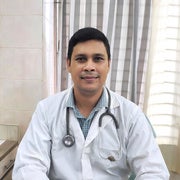The Global Health Delivery Project
Our mission is to improve the health of people everywhere by supporting clinicians at the frontlines to make better decisions and deliver value-based health care using proven approaches and evidence.
Brigham and Women’s Hospital
Division of Global Health Equity
75 Francis Street
Boston, MA 02115
Serving My Community: An Interview with Md Ismail Gazi

Ismail is a medical doctor at the National Gastroliver Institute & Hospital in Dhaka, Bangladesh
What do you do?
I am a doctor and permanent member of the Bangladesh Civil Service. I am also a former United Nations peacekeeper in Mali, and am currently deployed with the UN peacekeeping mission in the DR Congo.
Why did you apply to GHDI?
I applied to gain an understanding of healthcare delivery and strengthen my ability to design low-cost, community-based interventions in resource-limited and conflict-affected settings. Coming from such a setting, I was drawn to GHDI’s unique focus on equity, implementation science, epidemiology, pragmatic problem-solving, health systems leadership, and global collaboration.
What work have you been most proud of in your career and what is something that you still wish to accomplish?
I have facilitated thousands of hepatitis B vaccinations, partially contributing to the national hepatitis elimination goal by 2030. I ultimately hope to ensure that no one in Bangladesh dies from hepatitis B, a preventable and treatable disease. I want to see a future where everyone has access to screening, vaccination, and treatment so that no life is lost due to lack of awareness, stigma, or access to care.
What would you say to someone just starting out in healthcare in your country?
Engage in people-centered work with enthusiasm, compassion, and love. Always remain a learner and use your knowledge to serve others. Seek out global knowledge and experiences – you’ll discover solutions from others that can be adapted to your local context. Beyond being a good doctor or healthcare personnel, strive to become a skilled manager and leader. You will inevitably face challenges, but build strong networks, foster collaboration, and stay persistent. Most importantly, redefine success in your professional life. Success isn’t always big or visible. If you convince even one person to get vaccinated, you’ve made a life-saving impact.
What impact do you think GHDI will have on your career? What is your advice to someone thinking about applying to the program?
GHDI introduced me to practical tools and strategic frameworks that can address complex health system problems. I am now confident that with proper planning, strong leadership, structural thinking, and efficient resource and supply chain management, it is possible to deliver quality healthcare, even in resource-constrained or crisis-affected settings. If you’re passionate about global health, don’t hesitate to apply. It’s an unparalleled opportunity to grow into a thoughtful, grounded leader in the field.
What continues to fuel your inspiration and drive your work?
I am driven by the lived reality of the communities I serve. I grew up in a resource-limited community, so I have seen how a lack of access to quality healthcare causes unnecessary suffering and inequality. Still, people do their best to survive, and that resilience continues to motivate me.